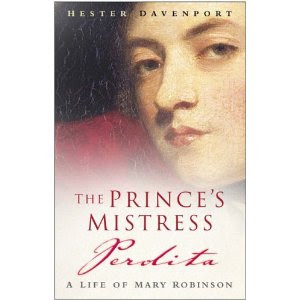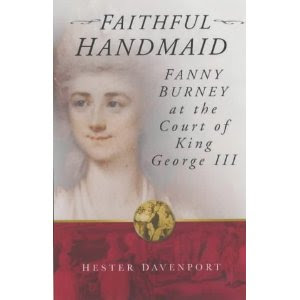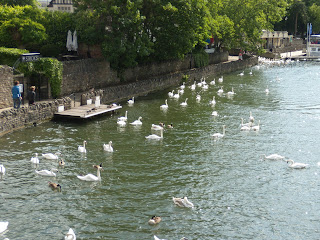
On Tuesday, June 15, Kristine, Brooke and Victoria took the train to Windsor to meet Hester Davenport, a well-known scholar on Fanny Burney and Jane Austen, as well as the author of several books. At right, her biography of Mary Robinson, who was not only the Prince’s Mistress, but an actress, poetess and author as well. More later in this blog.
Hester lives in Old Windsor and is an avid historian of her home town. She is also the former director of Dr. Johnson’s House in London. We had never met until this day and her kindness and gracious hospitality was remarkable. We share some friends, particularly Jo Manning, an occasional contributor to this blog. Hester had just returned from the Burney Society meeting in Paris where she was one of the speakers. She had a perfect day planned for us, complete with some special surprises. We first had a chuckle at the street sign that is near the castle.

Peascod Street is pronounced Pes’cod Street. The name derives from peapods, a staple of the medieval diet, according to a lovely book presented to Kristine and me by Hester Davenport: Windsor: Fun, Facts, History & Legend by Caroline Wagstaff.

We headed first to the Guildhall, on the High Street, the center of Windsor government. It is the venue in which Prince Charles married Camilla, Duchess of Cornwall in 2005. On the north side of the building is Queen Anne.

On the south side is her husband, Prince George of Denmark. One the ground level is a market area, once used for local produce.

A better view of the entire structure. Take note of the crooked building at the left. And see below.
After showing us around the Guildhall

, Hester took us downstairs to the archive of local newspapers where she and other volunteers are indexing several hundred years worth of the Windsor and Eton Express. We met Sue, one of the volunteers who was busily working away.

Hester, bless her heart, knew of Victoria and Kristine heading to Waterloo and our interest in the Duke of Wellington. In advance of our visit she had marked some issues from 1815 in which the Duke’s Dispatch announcing the victory was reported, as well as some stories about the returning soldiers and events held in Windsor in their honor. We were really knocked out by such thoughtfulness. Thank you again, Hester and Sue. A perfect addition to our wonderful visit.

This is Market Cross house, in which the upper and lower halves seem set on a different slant!! It’s a popular tourist attraction, of course, and many explanations have been given for the odd shape of the house. I like the idea best that the builders of the Guildhall next door tried to push the narrow structure away from its elegant red bricks.

This oval sign on Falstaff’s Pub says “The Old King’s Head — William Shakespeare lived here in 1597 when writing The Merry Wives of Windsor” but we are advised not t
o believe a word of it! Caroline Wagstaff’s book tells us that the saying “The world’s my oyster” is first found in a speech by Falstaff in
The Merry Wives of Windsor.
Set upon one of the walls near the castle is this plaque honoring Mrs. Mary Delaney, an artist and “friend of royalty” and the author Fanny Burney who served Queen Charlotte as Keeper of the Robes for some years.

Hester also is the author of
Faithful Handmaid: Fanny Burney at the Court of King George III. The mid point of our day with Hester is reported in our blog on Royal Windsor, so now we will skip ahead to later in the afternoon, after we had seen the Queen, the Castle and environs and enjoyed a lovely outdoor luncheon. Brooke left us to survey the shops (and pubs) while Kristine and Victoria continued our adventures with Hester.

On the way to the car park, we strolled past this handsome memorial, recently cleaned and renovated. It was designed by famed architect Sir Edward Lutyens (1869-1944). It is a fountain dedicated to the memory of King George V (1865-1936).

There are thousands of swans on the Thames and about a third of them belong to the Queen. Every July, the ceremony of Swan Upping marks all the swans and counts them. In years long gone by, swans were an integral part of royal feasts.

Hester drove us to Old Windsor, a village just south of the main town, where she lives. We stopped at the Church of St. Peter and St. Andrew, first built in 1216, and rebuilt in 1863. We went to the churchyard to see the tomb of Mary Robinson (1757-1800), nee Darby.

Mary was an actress when the young George, Prince of Wales (later George IV) saw her appearing as Perdita in Shakespeare’s
A Winter’s Tale on the London Stage. Calling himself Florizel, he carried on his first “public” affair with her.

Later she returned to her writing career and published many poems and some novels. She died at an early age, never able to escape her reputation as a former mistress of the Prince of Wales and establish herself as a serious writer.
After our visit to Mary, Hester took us to her lovely home for tea. We enjoyed the late afternoon in her garden, which her husband showed us around. They have a long garden with many kinds of plantings, including a charming little pool at the terrace.
Many thanks to Hester for our PERFECT day in Windsor. She carefully thought out every detail and we truly appreciate it. An inforgettable day!!
 On Tuesday, June 15, Kristine, Brooke and Victoria took the train to Windsor to meet Hester Davenport, a well-known scholar on Fanny Burney and Jane Austen, as well as the author of several books. At right, her biography of Mary Robinson, who was not only the Prince’s Mistress, but an actress, poetess and author as well. More later in this blog.
On Tuesday, June 15, Kristine, Brooke and Victoria took the train to Windsor to meet Hester Davenport, a well-known scholar on Fanny Burney and Jane Austen, as well as the author of several books. At right, her biography of Mary Robinson, who was not only the Prince’s Mistress, but an actress, poetess and author as well. More later in this blog. A better view of the entire structure. Take note of the crooked building at the left. And see below.
A better view of the entire structure. Take note of the crooked building at the left. And see below. , Hester took us downstairs to the archive of local newspapers where she and other volunteers are indexing several hundred years worth of the Windsor and Eton Express. We met Sue, one of the volunteers who was busily working away.
, Hester took us downstairs to the archive of local newspapers where she and other volunteers are indexing several hundred years worth of the Windsor and Eton Express. We met Sue, one of the volunteers who was busily working away.  Hester also is the author of Faithful Handmaid: Fanny Burney at the Court of King George III. The mid point of our day with Hester is reported in our blog on Royal Windsor, so now we will skip ahead to later in the afternoon, after we had seen the Queen, the Castle and environs and enjoyed a lovely outdoor luncheon. Brooke left us to survey the shops (and pubs) while Kristine and Victoria continued our adventures with Hester.
Hester also is the author of Faithful Handmaid: Fanny Burney at the Court of King George III. The mid point of our day with Hester is reported in our blog on Royal Windsor, so now we will skip ahead to later in the afternoon, after we had seen the Queen, the Castle and environs and enjoyed a lovely outdoor luncheon. Brooke left us to survey the shops (and pubs) while Kristine and Victoria continued our adventures with Hester.
Wonderful recap of your lovely visit! So happy you had a beautiful day, too. Hester Davenport is a very dear lady, very accomplished, very smart — a terrfic researcher — and very modest, too. Her books are well worth reading. Her bio of Mary Robinson is by far the best of the three most recent ones published.
I recently visited Old Windsor Church, and found Perdita's peaceful resting place. Perambulating the churchyard, I was pleasantly surprised to find the grave of another notable – Hester, the second wife of Richard Brinsley Sheridan. He used to call her 'Hecca'. It seems Old Windsor has more than one connection to Regency theatre!